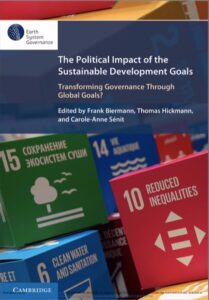Inclusiveness
The Political Impact of the Sustainable Development Goals: Transforming Governance Through Global Goals?
| Year | : | 2022 |
|---|---|---|
| Author/s | : | Carol-Anne Senit, Chukwumerije Okereke, Lorena Alcazar, Dan Banik, Mairon Bastos Lima, Frank Biermann, Rongedzayi Fambasayi, Ibrahima Hathie, Annica Kronsell, Hanna Leonardsson, Navam Niles, Karen M. Siegel |
| Area/s | : |
How and to what extent have the Sustainable Development Goals helped to achieve more inclusion and better support for poor and vulnerable groups within countries? And internationally, have the Sustainable Development Goals led to a fairer global economic system and given least developed countries a stronger voice in global governance?
These are the key questions we address in this chapter, which analyses the scholarly literature on the steering effects of the Sustainable Development Goals with a view to inclusiveness within and between countries. We first conceptualize inclusiveness and outline how it relates to concepts such as participation, equity, and democratic legitimacy. We then analyse the evidence in the literature on whether and under what conditions the Sustainable Development Goals have fostered inclusiveness at national and global levels. We assess progress on inclusiveness in different contexts and whether any variation in inclusiveness since 2015 can be attributed to normative, institutional or discursive steering effects of the goals.






